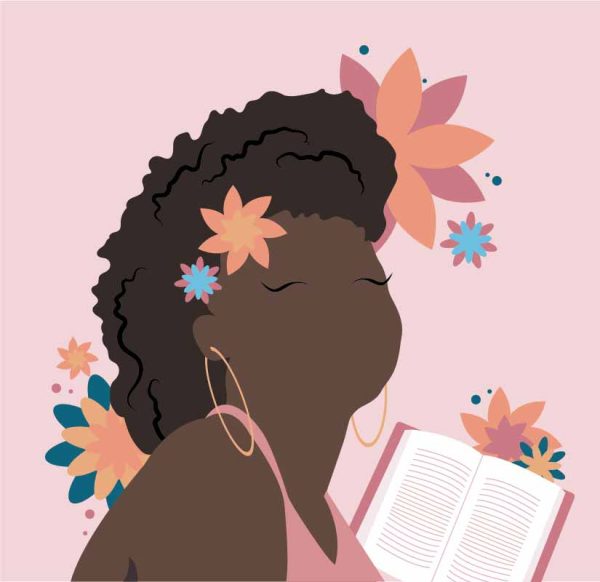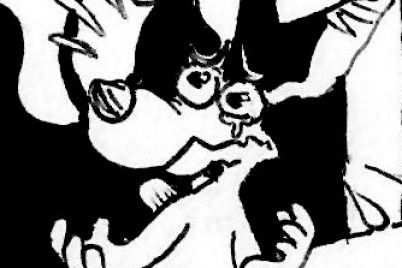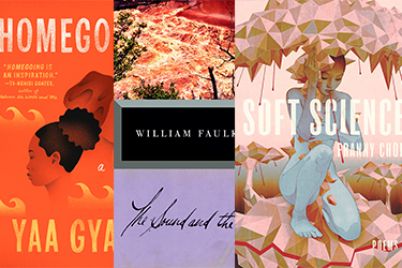
Illustration. Grace Faver | Washtenaw Voice
Alice McGuire
Staff Writer
As we wish winter goodbye, spring makes way for the beauty and celebration of reading and Women’s History Month.
Amy Higgins, a humanities, social and behavioral sciences faculty member, and Maryam Barrie, an English and writing professor at WCC, provide insight into women, their impact on literature and the need to recognize equality.
Barrie describes herself as having been “a little kid who read an enormous amount.”
“I was always really drawn to hearing voices that weren’t in my environment. So I read a lot of black authors and a lot of women authors,” she said, recalling a childhood spent as a “little brown girl” in the city of Saline with a mother who declared to the local librarian, “She can read whatever she wants to.”
“Reading women has just made sense for me,” she said.
Amy Higgins’s introduction to women in literature was different.
While women certainly played a part in her formative years due to the works of authors like Laura Ingalls Wilder and the efforts of women such as the high school English instructor who sparked Higgins’ passion for teaching literature, it wasn’t until the culture shifted during her college years that she began to pay close attention to what voices were being “sidelined, controlled or censored.”
“It wasn’t something that I got conscious of or intentional about until college. Because that was kind of a second wave of feminism in America–for me, a first wave–so I took a women’s studies course and started being much more intentional about reading women writers of the time,” said Higgins.
It’s important to read women’s stories and how to avoid falling into the trap of reading one story by one woman and thinking that alone is enough to capture every single lived experience. Barrie pointed out that women compose about 51% of the population and that reading diverse stories helps to destroy the notion that some human beings are not fully human.
“It’s always gonna be the individual snowflake. We’re each informed by different experiences, different cultural backgrounds, different genetic makeups. The deeper we get, the more I think we realize there’s not really a normal experience. There’s not really a generic story–there’s many, many stories,” she said.
Extrapolating on the topic of just how many identities often intersect with the role of a “woman,” Barrie turned to Murasaki Shikibu’s “The Tale of Genji,” saying, “I teach the first chapter of that, which is like: Genji and his guy pals sitting around, talking about who the best women are. And one of his friends is like, ‘I need her to be super pretty, smart, a good conversation partner or whatever.’ And Genji, throughout the whole thing, says there’s something beautiful about every woman. It’s like Murasaki Shikabu is saying, through this romantic hero, there’s something in every woman that’s wonderful.”
Women in history have not had the same educational access as men, even though women have always written.
“Virginia Woolf sort of says it all in her essay, ‘A Room of One’s Own,’ Barrie said. “Where she imagines William Shakespeare’s sister not having the leisure–the ability to get educated the way he got educated–to read and write.”
Barrie pointed out that, at least in the United States, we have seen more women’s voices since the late 1800s, a trend that she attributes to women having the time, space and circumstances that allow them to read, write and attain an education.
Of course, one cannot help but wonder why many of the greatest works by women star male leads–and not so much the other way around–a trend that Higgins and Barrie both explained similarly.
“You had to know how to step into a male perspective–not as though there’s only one–but you needed a kind of chameleon quality. For men, I think that hasn’t come naturally as there haven’t been cultural or social pressures to do that. But as a woman, you had to do it to succeed in almost any field. At least for a long time,” said Higgins.
There’s societal pressure for women to meet these expectations and Barrie added, “Women get a lot of training in imagining how other people are doing, and they’re expected to cater to and understand the people around them in ways that men–not all men, obviously–do not. We’re trained to be accommodating and easy to get along with. The expectation is there whether we’re rebellious about that or not.”
Amy Higgins’ book recommendations
“Jane Eyre” by Charlotte Bronte
“Their Eyes Were Watching God” by Zora Neale Hurston
“Parable of the Sower” by Octavia Butler
“Demon Copperhead” by Barbara Kingsolver
“The Awakening” by Kate Chopin
“True Biz” by Sara Novic
Maryam Barrie’s recommendations for women writers from around the world, in the order in which they appear in her ENG 214 course:
Warsan Shire–Somalia/UK
Taslima Nasrin–Bangladesh
Fatimah Asghar–Pakistan/US
Murasaki Shikibu–Japan
Sei Shonagon–Japan
Marjane Satrapi–Iran
Nadine Gordimer–South Africa
Bessie Head/Rhodesia–Botswana
Chimamanda Ngozi Adiche–Nigeria


